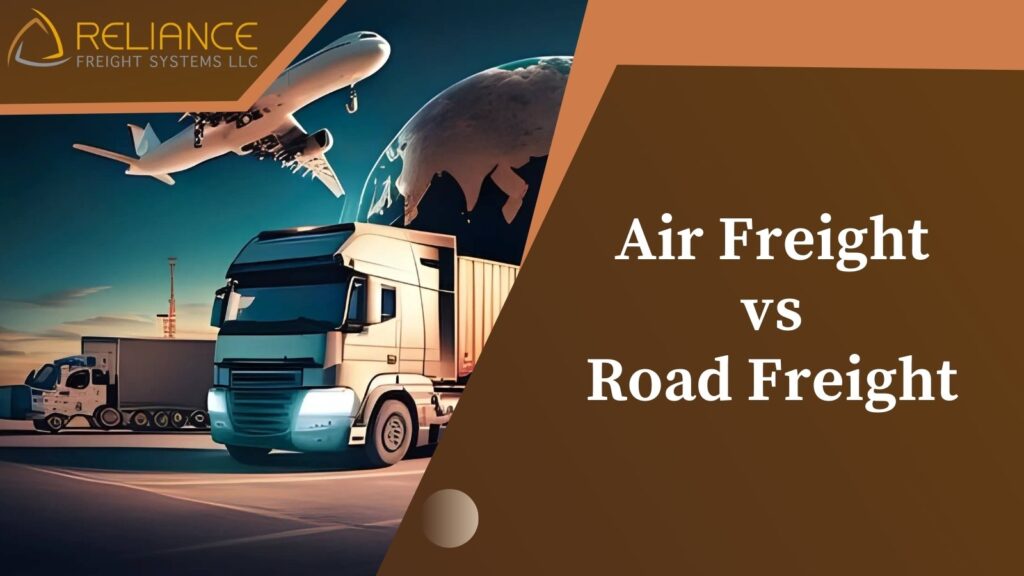When picking the proper freight transportation method, businesses take a long time and often get confused between air and road transport. Each has its own set of merits and demerits. Below, we will consider the criteria for choosing the right type of freight, compare the advantages versus the disadvantages of land and air transportation, and finally give a comparative analysis to help you make the right decision.
Before moving further, let’s find out what freight means.
Generally, freight means cargo or goods moved from one place to another by various mediums of transport, including ships, trucks, trains, or airplanes. It is also used in logistics and shipment, meaning the movement of goods.
Core Criteria for Choosing the Type of TransportYou will need to consider various points to make the right decision on your choice of transport:
- Speed: If the shipment is time-bound, air freight offers unmatched speed. Road freight transportation, on the other hand, allows more flexibility in delivering but is generally slower.
- Cost: Is air freight expensive? Yes. Typically, the cost of air freight surpasses that of land cargo transport. High costs associated with air travel often make it a less attractive option for less urgent shipments.
- Type of goods: Air freight may prefer fragile or valuable goods over quantity because of less time in transit and handling. For bulkier and heavier shipments that are still not time-sensitive, cargo transportation by road is the best alternative to air freight.
Strengths
- Speed: It is much faster than the alternatives. It delivers cargo in days, sometimes in hours.
- Fewer Handling: The fewer things to handle, the lesser the risks of getting damaged.
- Worldwide Reach: Can access remote destinations efficiently.
Weaknesses
- Expensive: The two modes are way too costly.
- Capacity Limit: Limits to the weight and capacity of the plane.
- Weather Dependency: May face delays in case of poor weather conditions.
Road Freight
Strengths
- Cost-effective: Road transport is generally cost-effective, making it ideal for long distances and bulk shipments.
- Flexibility: Offer door-to-door delivery with complete control over route flexibility.
- Capacity: Normally, it has a much more significant volume capacity as compared to airplanes.
Weaknesses
- Speed: Slower over long distances in comparison to the air freight express.
- Traffic and Weather: Weather and road traffic can slow its delivery.
- Security: Transportation by land is more susceptible to theft or damage than air freight.
Key Strategic Considerations While Shipping
For making decisions regarding choosing either air or land cargo transport, consider the following factors:
- Urgency: The speed of aircraft is the clear preference for critical cargo shipments.
- Budget: If the price is the primary consideration, land transport appears more suitable for the focused transport of less sensitive or non-time-sensitive goods.
- Nature of the cargo: The nature of the cargo, for example, perishability or value, may determine the mode of transmission. For example, if the cargo is too sensitive or expensive to warrant proper handling, the management may consider moving the cargo through the air.
The basic differences between air freight and road transportation are:
| Air Transport | Road Transport |
| 1. Faster for handling the consignment over long distances. | 1. It is slow. |
| 2. Costlier. | 2. Cheapest for distant, or bulk shipments. |
| 3. Not flexible and transport is done only by air to air. | 3. Flexible and has more options. |
Comparative Analysis: Rail Freight vis-à-vis Air Freight
While this article focuses on air vs. road freight, it is still better to quickly compare air freight with rail freight:
| Rail Freight | Air Freight |
| 1. Rail is not time-sensitive and is slower than air. | 1. Better than land, air transport is faster. |
| 2. It is inexpensive | 2. Expensive than rails. |
| 3. Has more capacity to carry heavy and bulky goods. | 3. Has more capacity to carry heavy and bulky goods. |
Factors to Think About While Deciding Between Sea and Air Freight
When one is deciding between sea and air transportation, some of the points should be considered:
- Cost: Sea freight is usually cheaper than air freight. Thus, it is more suitable for bulky consignments that are not urgently required.
- Speed: Air freight is much faster and may be suitable where the delivery time is very short, whereas sea freight takes several weeks.
- Type of Cargo: Sea freight is generally used for bulk and heavy cargo, whereas high-value and perishable goods are sent via air freight.
Types of Road Transportation
Below are the types of land transportation for shipments:
- Trucks: flatbread, refrigerated, tanker trucks.
- Vans: cargo and sprinter.
- Rail: freight rails, intermodal.
Choosing between land transport, air transport, or sea transport depends on your exact use and priorities.
- Connect with Reliance Freight Systems to get further detailed information with solutions catering to your specific needs.
- We are a freight forwarder, specializing in a wide array of air and sea freight services, such as air freight, ocean freight, consolidation, customs clearance, project forwarding, and more.
- We offer alternatives in cargo shipment and guide about the challenges of cargo transportation related to your business needs.


